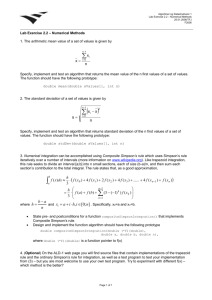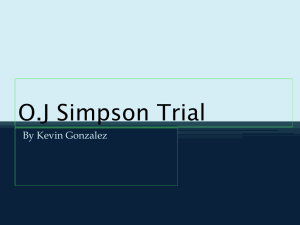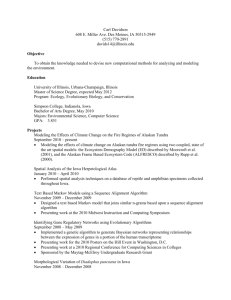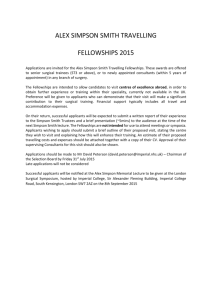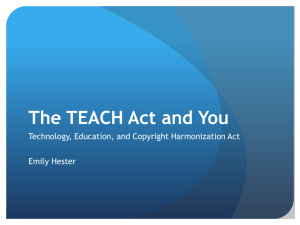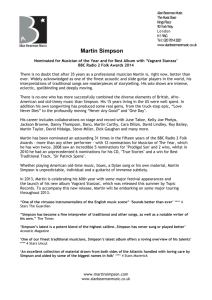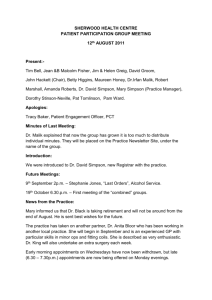Copyright and Fair Use PowerPoint
advertisement
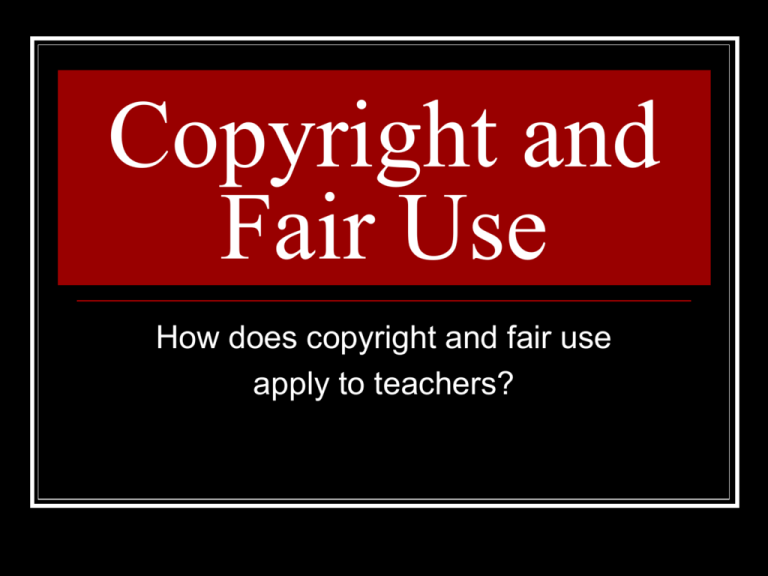
Copyright and Fair Use How does copyright and fair use apply to teachers? Copyright – History Lesson Dates back to English common law Only trained monks were permitted to copy – an early form of copyright enforcement First U.S. law signed in 1789 It’s nothing new – it’s been around a while Source: Waxer, 2006 What is Copyright? Legal concept enacted by most national governments Gives the creator of an original work exclusive rights Usually for a limited period of time Source: Waxer, 2006 Six rights that a copyright holder owns Reproduction Public Adaptation Digital Distribution Public Performance Display Transmission of Sound Recordings Source: Waxer, 2006 Reproduction Copies do not need to be exact to be considered reproductions If a drawing is recognizable, it is a reproduction Changing the format is also considered copying Source: Simpson, 2005 Adaptation Changing a work in some way Some artists very protective; others consider it flattery Examples: Picture book into play Student modifies artwork to create a new piece of art Writing new words to a song Source: Simpson, 2007 Distribution Passing out something copied is considered distribution Newsletters Showing videos Sharing software Worksheets Forwarding e-mail Publishing student work on the Internet Source: Simpson, 2005 Public Performance & Display Creator holds all rights to public performances and displays Classroom and school is considered public PTA, Scout Meetings considered public Ok to show in privacy of your home Family, friends and relatives – as long as the group is kept small Source: Simpson, 2005 Digital transmissions of sound recordings Licensing fees paid to the creator for the right to play sound recordings over the airways Developed because users can easily copy high quality audio files from the radio Source: Simpson, 2005 What is copyrighted? Literary works Musical works Dramatic works Pantomimes Choreographic works Pictures & graphics Sculptures Motion pictures Audio visual works Sound recordings Source: Waxer, 2006 How long is material copyrighted? Life of author plus 70 years If two authors, life plus 70 of the longest lived author If corporate authorship (ex: films) – 95 years from publish date or 120 years from creation date Source: Waxer, 2006 How long is material copyrighted? Not Copyrighted Created and published before 1923 Copyrighted Created before 1923 and not published varies Created between 1923 & 1978 – varies Created after 1997 Source: Waxer, 2006 What’s not copyrighted? Facts Government works Public domain Short phrases, terms and titles Works with non-protected material like phone directories, recipes, measurement charts, plain calendars Source: Simpson, 2005 Fair Use Allows limited use of copyrighted materials under certain circumstances Protects the rights of the creator while allowing legitimate use of copyrighted materials for education and research purposes Source: Simpson, 2005 Fair Use Exemptions Criticism Teaching Comment Scholarship News Research Reporting It does not mean that teachers can copy and distribute anything they want! Source: Simpson, 2005 Four Tests of Fair Use Is it non-profit or educational? Is it factual? The amount that is used – less is better The effect of use on the potential market – are you preventing him from making a profit? Source: Simpson, 2005 The Copy Machine (Thou can’s) You can make one copy from a book, newspaper, graph, cartoon, etc. and keep it in a file for use in teaching. You can read it to the class, make a transparency or post it on the bulletin board. You can make copies (one for each student) and use it one year/semester for one course. You can copy current articles, cartoons, charts, graphs from magazines or newspapers. You can copy anything you have permission for. Source: Simpson, 2005 The Copy Machine (Thou shall not’s) The department head, curriculum specialist or principal cannot make copies to give to every teacher in the grade level. You cannot make copies and use them for multiple courses or years. You cannot copy books (even picture books) You cannot copy from multiple issues to create a booklet or anthology. You cannot copy workbooks or other consumable books Source: Simpson, 2005 Graphics/Artwork (Thou can’s) You may use clip art from Microsoft Word if you own it You may use clip art from a source you have purchased (ex: ArtExplosion) You may use clip art or graphics from a service you or your district has subscribed to (ex: United Streaming) Source: Simpson, 2005 Graphics/Artwork (Thou shall not’s) You cannot art modify, enlarge or convert to another medium. You cannot combine characters from different sources to form new art. You cannot copy a cartoon and replace the words with new words. Source: Simpson, 2005 Movies and Videos (Thou can’s) You can show videos or CDs owned by the school library… You may use a work that was purchased by a teacher or student… You may use a copy borrowed from the library or the Region 4 media library… You may use a rented video… You can use a video from United Streaming As long as it is directly related to a topic your are teaching Source: Simpson, 2005 Movies and Videos (Thou can’s) Is it nonprofit educational? Is it in the classroom or other instructional place? Are the students all from the same class? Do you have a legal copy? Is it part of your curriculum? If you can answer YES to every question, you can. Source: Simpson, 2005 Movies and Videos (Thou shall not's) You cannot show videos for reward, recreation or entertainment. (Violation of public performance rights) Source: Simpson, 2005 Digital Resources Multimedia combines music, graphics, data and text in a digital format. Since the media used in the production is owned by the creator, guidelines were created to permit use. Educator Use for Curriculum-Based Instruction Source: Simpson, 2005 Digital Resources Guidelines Music, Lyrics and Music Videos Illustrations or Photographs Up to 10% - no more than 30 seconds No more than 5 images from one artist No more than 10% or 15 images from one collection Motion Media Up to 10% or 3 minutes Source: Simpson, 2005 Digital Resources Guidelines continued… Text Material Multimedia Project Up to 10% or 1,000 words 3 poems per poet 5 poems from different poets from an anthology No more than 2 copies may be made Numerical Data Set Up to 10% or 2,500 fields/cells from a database Source: Simpson, 2005 Digital Resources Guidelines continued… Teachers may show their own multimedia projects at conferences and workshops But…. you can only use it for two years Then you must get permission for each component 2 copies only All copyrighted components must be acknowledged Within the presentation (shorthand reference) Works cited (at the end of presentation) Source: Simpson, 2005 Digital Resources Guidelines continued… Teachers may show student work . . . If limited to only students enrolled in class Some kind of security prevents access by other students Source: Simpson, 2005 Digital Resources Guidelines continued… Students may keep their work indefinitely 2 copies only All copyrighted components must be acknowledged Within the presentation (shorthand reference) Works cited (at the end of presentation) Source: Simpson, 2005 But…it doesn’t have that little ©! In the U.S., almost everything created privately and publicly after April 1, 1989 is copyrighted and protected whether it has notice or not. Assume everything is copyrighted. But…I cited the source! Just giving credit to the author or owner does not protect you from copyright law violation. Exception – if you have a licensing agreement with an author, publication, or company But . . . it’s on the Internet! Everything on the Internet is subject to copyright laws. Even if it is free, you cannot use it without permisson. But…I don’t charge for it! You are still violating copyright laws if you are giving it away. You may not be making a profit, but you are preventing someone else from making a profit. But…I’ll never get caught! (1998) LA Unified School District (2004) Garland, Texas Unauthorized copies of Adobe Photoshop and Microsoft Word Fine: $5,300,000 Teacher copied entire TAKs workbook for students Fine: settled out of court (large fine – amount undisclosed) (2007) Fort Worth, Texas Administrator made multiple pages from a book and handed them out to faculty Fine: Had to pay for 300 copies of book + $15,000 Source: Simpson, 2007 Review Click on the attached hyperlink to view a 10-minute video on Fair Use http://cyberlaw.stanford.edu/documentary-film-program/film/a-fair-y-use-tale Source: Faddin, 2007 Quiztime Click on the attached to take a quiz on Fair Use and Copyright in Elementary Schools http://www.quia.com/pop/197847.html Quiz created by Cindy Coker in Quia http://www.quia.com/web It’s the right thing to do It’s the legal thing to do Sources Copyright Law and Fair Use. Retrieved January 17, 2008, from Stanford University Libraries/Academic Information Resources Web site: http://stanford.edu/cpyright.html Faddin, Eric. (2007) A Fair(y) Use Tale. Retrieved January 28, 2008, from Stanford Law School – The Center for Internet and Society Website: http://cyberlaw.stanford.edu/documentary-filmprogram/film/a-fair-y-use-tale Simpson, Carol (2007). Copyright Incidents Database. Retrieved January 28, 2008, from School of Library Information Science Web site: http://www.carolsimpson.com Simpson, Carol (2005). Copyright for schools - a practical guide. Worthington, Ohio: Linworth Publishing, Inc.. Waxer, Barbara M. and Baum, Marsha L (2006). Internet Surf and Turf - Revealed: The Essential Guide to Copyright, Fair Use, and Finding Media. Boston, Massachusetts: Thomson Course Technology.
